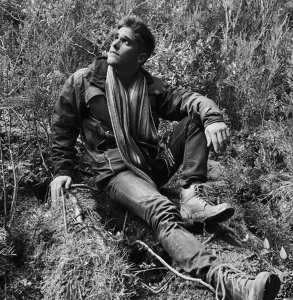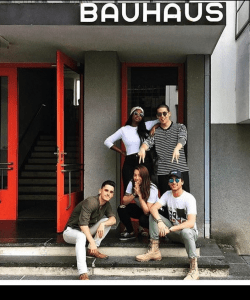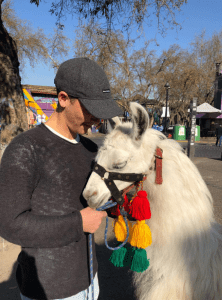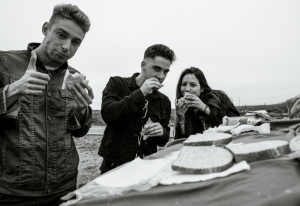G&EE recently caught up with Jason Katz (CCAS, Urban Studies, B.A. ‘20) to have a conversation about her time at George Washington University and her participation on three international experiences as part of GW's Global Bachelor's Program. Read more on the conversation just below -
G&EE: Tell us (and our readers) a little bit about yourself.
Jason: Hi! My name is Jason Katz, and I graduated from The George Washington University Columbian College of Arts and Sciences (CCAS) in May 2020 where I pursued a Bachelor of Arts in Urban Studies with a minor in Spanish Language and Literature. I designed the curriculum for my major through the Special Interdisciplinary Major Program (SIM) under the guidance of a faculty panel. I was also a member of the Global Bachelor’s Program, a research program based in international study. My research focused on the negotiation processes behind large scale modernization efforts in developing cities.
Hi! My name is Jason Katz, and I graduated from The George Washington University Columbian College of Arts and Sciences (CCAS) in May 2020 where I pursued a Bachelor of Arts in Urban Studies with a minor in Spanish Language and Literature. I designed the curriculum for my major through the Special Interdisciplinary Major Program (SIM) under the guidance of a faculty panel. I was also a member of the Global Bachelor’s Program, a research program based in international study. My research focused on the negotiation processes behind large scale modernization efforts in developing cities.
Although I have completed fieldwork that focused on Washington, D.C., most of my urban studies research has been conducted through the Global Bachelor’s Program during a summer study in Berlin, Germany as well as three semesters abroad in Shanghai, China; Santiago, Chile; and Buenos Aires, Argentina.
G&EE: How did you hear about the Global Bachelor’s Program and what drew your interest to apply to the program?
Jason: I heard about the Global Bachelor’s Program early in the fall semester of my freshman year as I was waffling between pursuing a dual degree in English and International Affairs or designing a major that focused on urban research. From my reading and travel, I imagined global cities to be spaces where narrative and physical composition mixed and socially-produced space could emerge. I was thrilled at the opportunity to design my own undergraduate curriculum in Urban Studies that could treat global cities around the world as a subject matter, research laboratory, and playground all at once. Three semesters of rucking my way through Asia, Europe, and Latin America seemed like a tremendous opportunity to get the most out of my field of study.
G&EE: Prior to the Global Bachelor’s Program you spent time in Berlin, Germany. What took you to Berlin and how did that connect to your future experiences on the GBP?
During the Spring of my freshman year, I took a Dean’s Seminar course in Modern Architecture with Professor Stephanie Travis. The Dean’s Seminar courses are really wonderful and provide freshmen in CCAS with the opportunity to take upper level coursework in a variety of subjects. After the course, Professor Travis mentioned that there was a short-term study abroad program to Berlin, Germany being hosted by the Interior Architecture department. I had a really amazing time on the program and got to meet with a lot of wonderful undergrad and Master's students in the Interior Architecture program. We learned about the rebuilding and reunification of Berlin after World War II and the Cold War through the lens of historical preservation. In addition we made trips to places like the Bauhas, the Rechstag, and the Neues Musem. A of departments do short-term study away programs like this! I really couldn't recommend it enough. The programs offer amazing opportunities to engage with faculty-directed research early in your undergraduate career.

For my Global Bachelor’s semesters, I continued doing this kind of site-based research. In Shanghai, I engaged in a sociological study of the conversion of historical workers’ communities into boutique commercial centers. During my semester in Santiago de Chile, I performed ethnographic research with a team of architecture students on the successes of a historic auto-constructed neighborhood. Lastly, in Buenos Aires, I completed research on the urbanization of the largest informal settlement in the city.
G&EE: Your first semester abroad with GBP was to Shanghai, China. What were your expectations for this program before you departed and how did they change? How did the experience challenge you? In what ways did this experience impact your following international experiences as well as your time at GW?
I tried reading up on the history of Shanghai before I left for China to get some cultural and historical grounding before I arrived. Even so, I had little awareness of the daily experience of the chaos of Shanghai. It is a wild, roiling city that brews contradiction. Shanghai is a city of 25 million people that had grown so fast by the Spring of 2018 that the government had added a brand new metro line every year for the past decade. February of 2018 was the beginning of the bikeshare craze, where brands like Ofo and Mobike were flooding sidewalks with piles of bicycles five feet high; the year that Wuhan held Placemaking Week, the international urban studies conference; a Spring that was in the middle of the trade war between the U.S. and China, when I had the opportunity to study trade disputes closely with my program director Dr. Steven Suranovic through his course in International Economics.
It was a semester of dramatic changes in China and the world that were felt quite intensely in Shanghai. In order to not get lost in the busyness of the city, I had to grow flexible and adaptable to match the intensity of the pace of life around me. It was crucial for me to organize a sense of routine and structure in my schedule so that I could budget my time and finances to do all of the wonderful things available! That experience of organizing for spontaneity became an iterative process that I was able to take with me and repeat again in my second and third semesters abroad.
G&EE: GBP Program 2: Your second semester abroad with GBP was to Santiago, Chile. Why did you choose this particular program for your second international experience? What did you study and did your time there shift your academic or professional interests?
Jason: My second semester abroad was in Santiago, Chile during the Summer/Fall 2018 semester. In order to complete a minor in Spanish Language and Literature, my main criteria for my second semester was that I wanted to be in a Spanish-speaking country that allowed for a high degree of cultural immersion where I could take all of my classes in Spanish. I ended up studying at Pontificia Universidad Católica de Chile in Santiago de Chile, which is renowned for its Urban Studies faculty.
In 2016, the Chilean architectural firm ELEMENTAL won the Pritzker prize for Architecture. This, along with my love of poet Pablo Neruda, protest-singer Victor Jara and the novelist Roberto Bolaño was enough to spark my interest in the GW Chile program. I was very fortunate to find out that the Resident Director for GW Chile, Lise-Anne Stroeschank, was an incredible resource and facilitator, taking a warm and engaging but distanced approach to helping curate the best individualized abroad experience for her students. Lise-Anne’s husband Mauricio, also taught an incredible class in the history of Chile that I would highly recommend.
G&EE: Your third semester abroad with GBP was to Buenos Aires, Argentina. Why did you choose this particular destination for your third international experience? What did you study and did your time there? Did it shift your academic or professional interests? How may it have been different than your prior experiences?
After reading Rayuela by Julio Cortázar my senior year of high school, I travelled to Buenos Aires in 2016 right after graduation, where I stayed in a hostel for a month and worked at a local culture magazine. I always wanted to return to Buenos Aires, and study there for a longer period of time. For my third international experience, I chose to return to Buenos Aires and study at La Universidad Torcuato di Tella in the Architecture faculty. It was a really wonderful and immersive experience as an Urban Studies major because I had the opportunity to work in small teams with architecture students to deal with complex urban problems like heritage preservation, which seeks to preserve and protect features of historical significance in the urban environment. It was a really special time and a perfect way to cap my Global Bachelor’s experience. I got approval from CCAS to stay in Buenos Aires over the summer to conduct research on the urbanization of Villa 31, the largest informal settlement in the city.
G&EE: Cultural immersion leads to the enhancement of transferable skills (flexibility, team work, leadership, listening, communication, problem solving, critical thinking). Reflecting on your experiences abroad, what are one or two transferable skills you improved and provide a brief anecdote about it.
Jason: I learned how to pack, unpack, and repack my bad really well! I also developed specific tastes regarding objects and accessories that I had given little thought to before, like toiletry bags, camping rucks, and fanny packs. A really special benefit of moving around so much and having to be in so many different challenging situations is that you get accustomed to maintaining a sense of presence even when everything around you is changing.
G&EE: You participated in a wide range of mobility programs all around the world! Do you have a favorite memory or experience in all of your travels? Did you travel anywhere else during your free time?
Jason: I did a lot of independent traveling after each of my experiences abroad. After my short term study abroad in Berlin, I took a train to Amsterdam, and then travelled to Copenhagen and Prague.
After Shanghai, I grabbed a duffel, left my six months worth of luggage with some very generous friends from the program (see Spencer’s blog post here) and solo travelled on a two week fling to Seoul (and a visit to the DMZ between South and North Korea), Tokyo (for a visit to the world famous tune auction at the Tsukiji market), Koh Phangan (for snorkeling and the Full Moon Festival), Singapore (where I visited a Michellin Star soya chicken hawker stand), and Hong Kong (for a 4th of July at the world's tallest outdoor bar).
After the semester in Chile, I hitchhiked and backpacked with a friend for 17 days from Santiago de Chile all the way down to Parque del Torres del Paine in Patagonia, where we hiked the famous W Trail.

After the semester in Buenos Aires, I went on a week-long Jeep trip through Bolivia. On the way back, we were snowed out of crossing the Andes back to Argentina, and I took the opportunity to go see my host family and in Santiago de Chile from the previous semester and introduce them to my friends. On the way back from Santiago, we were met with the massive blackout that affected 50 million people in the Southern Cone in June of 2016. 20 hours of busses later, we arrived back in Buenos Aires where power was restored.
G&EE: Reflecting your overall experience on the mobility programs, what are some key observations, takeaways, and pieces of advice you would give to prospective students?
Jason: Each international experience that you have will be intense, and filled with a variety of opportunities to travel and try new things. Six months can seem like a long time, but without structure and perspective, it can fly by in a flash. I would highly recommend making a list of activities that you want to try before you leave for your location, at a wide range of price points and time commitments, and revise it as you experience things, meet and speak with people. Try to set intervals each week to reflect on where you are and have a different activity or goal for every week. This way, you will have some semblance of structure, and be able to timestamp your experience abroad and make tangible the things you want to accomplish.
 Many of these international programs can serve as platforms from which you can build a Fulbright application, or another application for international research. I would highly recommend keeping in touch with your home faculties and making academic connections abroad to see if any of your trips could support international research that relates to your field of study. If applicable, this could be an invaluable experience that could help jumpstart your career or support advanced academic research.
Many of these international programs can serve as platforms from which you can build a Fulbright application, or another application for international research. I would highly recommend keeping in touch with your home faculties and making academic connections abroad to see if any of your trips could support international research that relates to your field of study. If applicable, this could be an invaluable experience that could help jumpstart your career or support advanced academic research.
G&EE: Did your experience on GBP influence your decision to return to GW for the Master's of Science in International Business program?
Jason: I designed my undergraduate major with the intention of understanding how global cities operate, cooperate and compete internationally. Through the Global Bachelor’s Program, I was able to research international and inter-jurisdictional policy transfer and the application of best practices across metropolitan areas. For my Global Bachelor’s Capstone, I explored the possibility of transferring a German cohousing model to Northern Virginia to help address a supply gap in the housing market. My research on Amazon’s influence in Northern Virginia clarified for me that additional study into the role that multinational firms play in the global political economy would be tremendously beneficial to me. I came to recognize that an MS in International Business would deepen my understanding of the fractious global landscape of local economic, political and regulatory environments. The MSIB program has also offered the wonderful opportunity to work with Dr. Anna Helm on an independent study for the Spring related to "discursive whitening" in global cities, the manipulation of community narratives in neighborhoods by real estate developers in order to manufacture market value.
--

